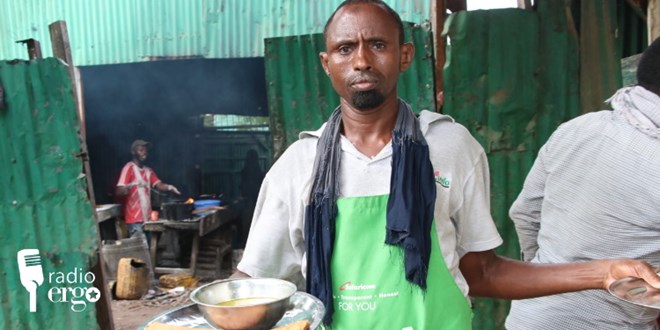
Saturday January 21, 2023

Shafi working his shift as a waiter in Dadaab’s Midnimo restaurant/Bashir Gahnug/Ergo
Shafi Mohamed Warsame, 47, is living his second life as a Somali refugee in the Kenya camps in Dadaab and this time he is determined to become an independent businessman.
Right now, he is working 12-hour shifts in the busy Midnimo restaurant in Dadaab, slogging away for the future.
“I earn about 400 shillings [just over three dollars]. You might think there is nothing to save from that, but I set aside 50 or 100 shillings. When the situation gets tough, I draw on the money. My aim is to save enough money to make an investment in a business,” he said.
Shafi, married with four sons between the ages of five and 11, first came to Dadaab in 2006. His family took voluntary repatriation back to Somalia in 2018, but he was unable to settle down there. He travelled to Kismayo, Galkayo, Mogadishu, and Garowe, but could not find a job anywhere so returned to the refugee camps a year later.
This time he did not wait for aid handouts. He found a job in the restaurant and decided to save as much money as he could, working to augment the reduced aid that refugees receive these days.
Shafi’s boss, the owner of Midnimo restaurant, serves as something of a role model. Hussein Abdullahi Mohamed worked his way up from the bottom to buy the restaurant after 15 years of saving and getting promoted.
“I started washing dishes, then I became a waiter serving drinks, then a full waiter. I rose through the ranks and became a manager and today, I am the owner of the restaurant,” Hussein told Radio Ergo.
Hussein also arrived in Dadaab in 2006 with his wife and five children. His restaurant now employs 22 men and women from the camps. Being a refugee himself he understands the situation of other refugees
“I look into people’s situation and their level of hardship when I am employing staff. I even sometimes tell them how I started and how it is that today I got to own this restaurant,” he said.
Hussein gets the aid rations received by other families, although his family of 11 has many needs that could not be covered without income.
“I make money at the restaurant, if I don’t I would have closed down. I want to improve my children’s lives. For the aid organisations, if they had given me money to invest in a business instead of food aid, I think I would have succeeded in making more of myself in this society,” he said.
Another employee at Midnimo restaurant is Aday Ali Nur, 48, who is the only person earning a living in her family of 13 people. She works eight hours a day making flat bread.
“It is difficult, we are working over the hot fire and it’s hard, you need some good food to keep working here. Also walking at night to work is not safe, the restaurant is far and I leave the house
at 5:30 in the morning and walk alone. I am at risk of being attacked by thieves or even hyenas, it is scary,” she explained.
However, her hard work enables her to pay school fees for her seven children in primary and secondary schools. She hopes they will go further in life than she has.
“I go through all this hardship because of my children. I hope they will learn and get a better future so that they can also support me in my all age,” she said.